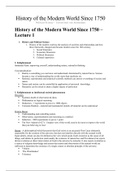History of the Modern World Since 1750
Political Science – Universiteit van Amsterdam
History of the Modern World Since 1750 –
Lecture 1
1. History and Political Science
1. History of the modern world as the analysis of societies and relationships and how
these interacted, changed and became modern since the 18th century.
1. Social Structures
2. Economic Structures
3. Political Structures
4. Cultural repertoires
2. Enlightenment
Immanuel Kant: improving yourself, understanding nature, rationalist thinking
Conceptualisation:
Reality is something you can know and understand, determined by natural forces. Science
became a way of understanding the world, more than medicine etc.
Rational, experimental and empirical scientific methods can answer everything of society and
nature
Nature and society can be controlled by application of universal knowledge
Humanity can be raised to attain a higher degree of perfection
3. Enlightenment as intellectual societal phenomenon
Descartes
Systemic doubt of observation & ideas
Mathematics as logical reasoning
Deduction - 1 experiment to prove to 1000 objects
Cartesian Dualism - material and nonmaterial (mind), all material can be understood
Francis Bacon
Understanding and controlling nature
Observation, experimentation and reasoning as a method
Induction - 1000 experiments to prove 1 point
The New Atlantis (1627) - Utopian view of the world, need to do more to improve the world
than just believing in God
Deism - A philosophical belief that posits that God exists as an uncaused First Cause ultimately
responsible for the creation of the universe, but does not interfere directly with the created world.
Equivalently, deism can also be defined as the view which posits God's existence as the cause of all
things, and admits its perfection (and usually the existence of natural law and Providence) but rejects
divine revelation or direct intervention of God in the universe by miracles. It also rejects revelation as
a source of religious knowledge and asserts that reason and observation of the natural world are
sufficient to determine the existence of a single creator or absolute principle of the universe.
Voltaire
‘The Watchmaker’
Tolerance
, Personal God - 1 on 1 relation in what you believe in
Dismissive of organized religion and the institution of the church
Enlightenment as a social & cultural phenomenon
Culture of salons, associations, loges etc.
Education
Women as gatekeepers (Geoffrin, Julie de Lespinasse)
Literacy brought on discussion, ⅓ of men could read and write, easier to transfer information
Censorship
4. Natural Law and Enlightened Political Ideas
Thomas Hobbes
The state of nature and natural law
o You don't want to live in the natural state, the only thing you can rely on is yourself.
All against all. Individualism
The monopoly of power
Absolute rule
o First amongst the people, all liberties to the ruler, a leviathan. Peace, stability,
structure and knowing what life is like. Rule of law creates indirect trust amongst
people.
John Locke
Personal liberties
o Government needs to ensure liberties
The consent of the government
o Advocates limitations of governmental powers
Parliament and representation
Property and labour
Liberalism
Jean-Jacques Rousseau
Economic inequality as foundational for general inequality
o Small wealthy population brings distrust and influence over poor classes
Social Contract and his critique of the French hierarchical society
The General Will
o The process towards the general good
o Authoritarian rule of law, no opposition
Baron de Montesquieu
L'esprit de lois (1748)
Trias politica as political structure for a division of governmental functions and powers
o Judicial, Legislative, Executive
Protecting liberty and society
5. Enlightened Despotism
Secular perspective by hereditary rulers
o Curtailing medieval forces and customs
o Centralising of government, taxes, infrastructure, laws
Driven by les philosophes and military necessity
Limits on reformability of hierarchical society and resurgent forced of church and nobility
Catalysing social unrest and problems
,
, History of the Modern World Since 1750 –
Lecture 2
The Industrial Revolution in England
Factor: technological innovations and the increase of scale
The Increase of production in manufacture/industry and agriculture was accelerated by technological
innovation (collaboration by entrepreneurs, technicians and scientists):
James Hargreaves’ spinning jenny (1764)
James Watt’s improved steam engine (1777)
Factor: The gradual disappearance of Commons and Open Fields
Rising prices of wool, wheat and other agricultural goods motivated farmers to invest in the
enlargement of landownership to enable more efficient use of land
Around 1700 between 40% and 50% of all English agricultural grounds were in common use;
around 1800 Commons and Open Fields were a rarity
Enclosures in England
The Enclosure Movement caused more private ownership in agriculture
Parliament enacted laws to facilitate the Enclosure Movement
Enclosure was the legal process in England of consolidating (enclosing) small landholdings
into larger farms. Once enclosed, use of the land became restricted to the owner, and it ceased
to be common land for communal use.
Plus the effect of technological innovation Resulting in greater production and profit motive
Jethro Tull (1674-1741) enlarged his privately owned land through enclosures and was
inventor of a seed drill and more efficient horse-hoe (to cultivate the land)
The potato became popular food in Northwestern Europe: more calories per unit of food
compared to wheat products. It served as a cheap source of calories and nutrients that was
easy for urban workers to cultivate on small backyard plots. Potatoes became popular in the
north of England, where coal was readily available, so a potato-driven population boom
provided ample workers for the new factories.
New scientific knowledge about the importance of hygiene
The use of soap
Improved hygiene in obstetrics: decrease of infant and maternal mortality
Development of smallpox vaccine (Edward Jenner 1796)
Consequences of population growth, technological innovation, private
ownership and profit motive
Migration of excess labor from rural areas to urban areas (urbanisation)
o Despite the growth in wealth and industry urbanization also had some negative
effects. On the whole, working-class neighborhoods were bleak, crowded, dirty, and
polluted.
Further increase of production and scale






